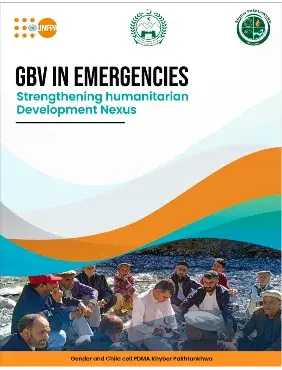The study was undertaken to assess the level of gender considerations in decision-making and awareness-raising processes to prepare and respond to humanitarian crises in all three phases (crises, relief, and recovery) at policy, strategy, and implementation levels. The existing related policies, contingency plans, and practices were reviewed to identify gaps in integrating GBViE in humanitarian response, to identify women and girls' accessibility to S/GBV and RH services and related challenges during disaster and emergency, and to provide a set of recommendations for effective integration of GBViE in preparedness and response approaches at policy, advocacy, and strategic levels.
The target region was three disaster-prone districts of the province of Khyber Pakhtunkhwa, Upper and Lower Chitral, and Swat. The qualitative research design was used, and the data was collected by focus group discussions (FGDs) and Key Informant Interviews (KIIs) that were conducted with adult men and women, adolescent girls and boys of the community, government officials, civil society, elected people, human rights activist, UN agencies, national and international humanitarian organizations. The study revealed that women and adolescent girls are among the most vulnerable groups during all three phases of disasters and humanitarian crises; GBViE is ignored in reviewed laws, policies, plans and humanitarian response; there is no GBV/GBViE protection policy and framework in the province; and coordination mechanisms are weak and less responsive in non-emergency periods and during humanitarian crises.
It is recommended by all the stakeholders that advocacy should be conducted to mobilize the Gender & Child Cell, PDMA Khyber Pakhtunkhwa to review and recommend changes in related laws, policies, plans and other humanitarian responses. It is recommended that GBV/GBViE protection policy and framework should be developed in the province, while PDMA may develop and implement DRR policy in the province, and PDMA may establish district level offices to implement DRR policy and other humanitarian response interventions. It was recommended that strong coordination, monitoring, referral, case management, and reporting mechanism should be developed to prevent GBV related cases during disaster and emergencies. The community was of the view that during needs assessments, women of the area should be involved so that their needs should be identified, documented, and met during the humanitarian response.


